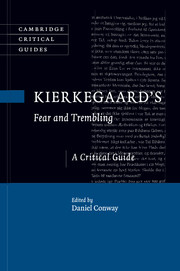Book contents
- Frontmatter
- Contents
- List of Contributors
- Acknowledgments
- List of Abbreviations
- Introduction
- Chapter 1 Homing in on Fear and Trembling
- Chapter 2 Fear and Trembling’s “Attunement” as midrash
- Chapter 3 Johannes de silentio’s dilemma
- Chapter 4 Can an admirer of silentio’s Abraham consistently believe that child sacrifice is forbidden?
- Chapter 5 Eschatological faith and repetition: Kierkegaard’s Abraham and Job
- Chapter 6 The existential dimension of faith
- Chapter 7 Learning to hope: the role of hope in Fear and Trembling
- Chapter 8 On being moved and hearing voices: passion and religious experience in Fear and Trembling
- Chapter 9 Birth, love, and hybridity: Fear and Trembling and the Symposium
- Chapter 10 Narrative unity and the moment of crisis in Fear and Trembling
- Chapter 11 Particularity and ethical attunement: situating Problema III
- Chapter 12 ‘He speaks in tongues’: hearing the truth of Abraham’s words of faith
- Chapter 13 Why Moriah?: weaning and the trauma of transcendence in Kierkegaard’s Fear and Trembling
- Bibliography
- Index
Chapter 5 - Eschatological faith and repetition: Kierkegaard’s Abraham and Job
Published online by Cambridge University Press: 05 February 2015
- Frontmatter
- Contents
- List of Contributors
- Acknowledgments
- List of Abbreviations
- Introduction
- Chapter 1 Homing in on Fear and Trembling
- Chapter 2 Fear and Trembling’s “Attunement” as midrash
- Chapter 3 Johannes de silentio’s dilemma
- Chapter 4 Can an admirer of silentio’s Abraham consistently believe that child sacrifice is forbidden?
- Chapter 5 Eschatological faith and repetition: Kierkegaard’s Abraham and Job
- Chapter 6 The existential dimension of faith
- Chapter 7 Learning to hope: the role of hope in Fear and Trembling
- Chapter 8 On being moved and hearing voices: passion and religious experience in Fear and Trembling
- Chapter 9 Birth, love, and hybridity: Fear and Trembling and the Symposium
- Chapter 10 Narrative unity and the moment of crisis in Fear and Trembling
- Chapter 11 Particularity and ethical attunement: situating Problema III
- Chapter 12 ‘He speaks in tongues’: hearing the truth of Abraham’s words of faith
- Chapter 13 Why Moriah?: weaning and the trauma of transcendence in Kierkegaard’s Fear and Trembling
- Bibliography
- Index
Summary
Introduction: the eschatological
For many decades now, students and teachers reading Kierkegaard have been troubled by the apparent irrationality of faith as depicted in his famous rendition of the Abraham and Isaac story, the Akedah: could a religious commitment that is central to my identity or to the meaning that life has for me really be exemplified by submitting to a horrifically immoral command to kill an innocent child, abandoning my own conscience to follow an allegedly divine voice, or blindly giving up control of my own actions to an inscrutable directing force allegedly higher than cultures and human reason? Unsurprisingly, many contemporary readers have found that not to be any form of worship worthy of the God who is Love (as Kierkegaard frequently wrote of the biblical God).
Ancient readers of the Akedah narrative in Genesis may not have been troubled in the same way. As Ronald Green has put it to me, Abraham “intending the death of his son” on Mount Moriah did not bother most “classical Jewish thinkers, because they never conceived of this act as murder. For them, Isaac was an appendage of the father, and Abraham’s act was one of supreme self-sacrifice.” In other words, in an archaic view according to which Isaac is Abraham’s most prized possession, his willingness to offer Isaac back to the same God who gave Isaac by miracle to his aged wife Sarah is proof of Abraham’s absolute devotion. However foreign this view of children is to us now, it helps remind us that the problems and lessons which Kierkegaard intends us to see in the story of Abraham and Isaac may not be close to those on which ancient Hebrew readers or medieval Jewish scholars focused. Our topic is Kierkegaard’s sense of the story, not the original Akedah itself, however far the implications drawn by his pseudonym Johannes de silentio may be from the true intent of the book of Genesis. And for him, the idea that Abraham might be guilty of attempted or intended (even if forestalled) murder is crucial. For as I will argue, his account aims to show that Abraham is not really a murderer from the perspective of faith, and counts as a murderer if and only if faith is cancelled.
- Type
- Chapter
- Information
- Kierkegaard's Fear and TremblingA Critical Guide, pp. 79 - 105Publisher: Cambridge University PressPrint publication year: 2015
- 1
- Cited by



